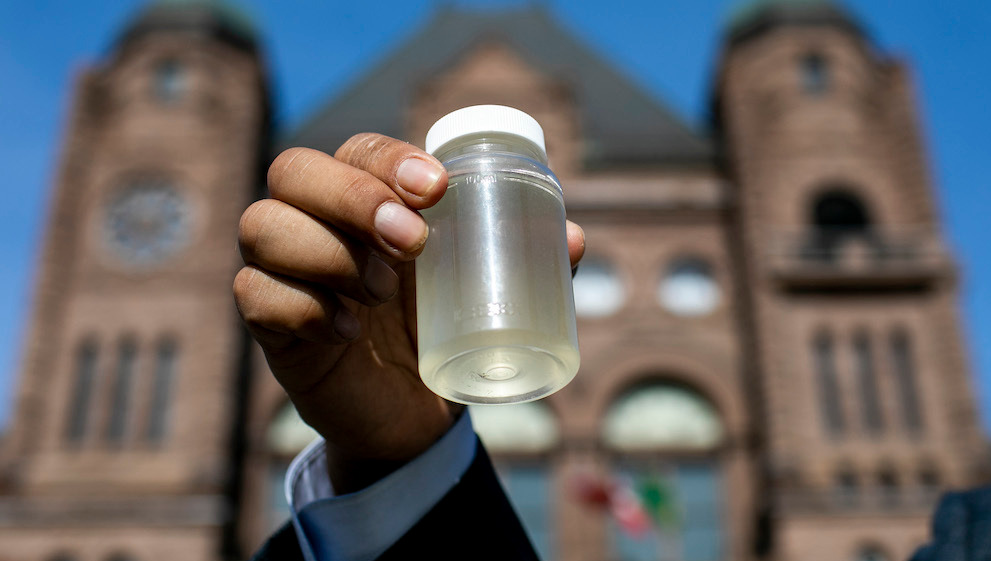
After residents from Neskantaga First Nation were evacuated over hydrocarbon-tainted water last October, Kiiwetinoong MPP Sol Mamakwa holds up a collected sample at a rally in Toronto. (File photo)
Ottawa, April 5 (RHC)-- Dozens of indigenous communities across Canada still have no access to drinking water more than a year into the coronavisus outbreak as the country’s liberal government has officially failed to deliver on its own five-year deadline to lift all drinking water advisories in First Nations reserves.
Canada’s Auditor General Karen Hogan presented a report in February documenting the total failure of successive Canadian governments -- including Justin Trudeau’s -- to provide for Indigenous communities’ most basic needs, insisting that “Access to safe drinking water is a basic human necessity,” according to the US-based World Socialist Web Site (WSWS). “I don’t believe anyone would say that this is in any way an acceptable situation in Canada in 2021,” Hogan added as quoted in the report published on WSWS Friday.
According to the report, in the years following the Liberal Party’s election victory, over $2 billion was allocated to improving water conditions for the affected First Nations reserves and currently 101 long-term boil-water advisories have been lifted.
However, 58 long-term advisories remain in effect across Canada—some of which have been in force for over two decades. For instance, the report underlined, Neskantaga First Nation in northern Ontario has been without access to clean water for more than 25 years, noting that on the home page of the nation’s website, a tracker is displayed that counts how many days it has been under the boil-water advisory. As of April 1, it read 9,555 days.
It further adds that Zhiibaahaasing First Nation of Silver Water, Ontario, was placed under a boil-water advisory in 1991, and Shoal Lake 40, a First Nation situated on the Ontario-Manitoba border, has been fraught with a long-term advisory for 23 years.
The report also points to research published between 2000 and 2015 on water and health in Indigenous communities in Canada which suggest that issues commonly reported in relation to contaminated water include cancers, skin problems, gastrointestinal system issues, birth defects, obesity, mental health problems, heart diseases, liver diseases, kidney problems, neurological problems, immunopathology and a high rate of infant mortality.
Infant mortality rates, it adds, are twice as high among Canada’s Indigenous population as they are in the general Canadian population. A crisis often occurs when multiple women in a birth center are in labor simultaneously, only for the center to suddenly run out of water.
According to the report, Prime Minister Trudeau has cited the COVID-19 pandemic as being a major contributing factor to the federal government’s failure to fulfill its pledge to provide First Nations with clean water.
However, Auditor General Hogan’s report makes clear that many of the government’s own objectives had not been met prior to the pandemic’s eruption nearly 13 months ago. Hogan also pointed out that the government has not updated its funding formula for First Nations’ water systems for thirty years.
The Canadian government has not tracked or studied water-related illnesses. Even the First Nations Health Authority in British Columbia, the first province-wide health authority established to serve First Nations in Canada, does not track water-related illnesses or deaths on BC reserves.

